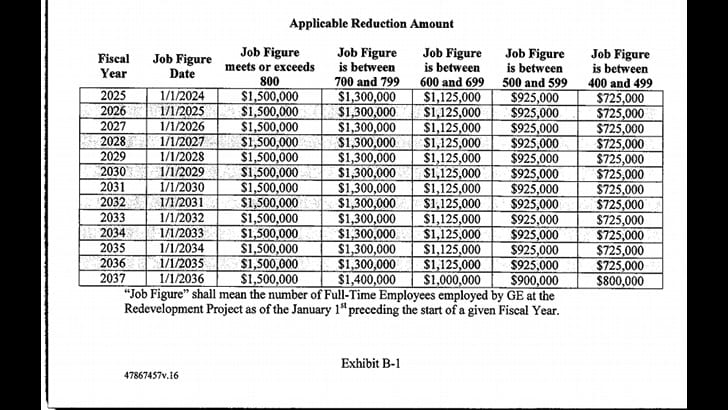
As the one-time corporate behemoth slinks away from the chaos it created in the Bay State (yet again)
While my DigBoston and BINJ colleagues and I do occasionally skewer the Boston Globe, we don’t make a habit of it. Because, as I’ve written before, we recognize that the venerable newspaper is at the center of the regional news ecology in the northeastern United States. And we, like every other news outlet from Hartford to Bangor, rely on Globe reporting to decide what we should cover and how we should cover it. In the case of my crew, we’re looking for issues that the Globe missed … or issues that we think the Globe covered poorly.
By the same token, sometimes we don’t cover something because we think the Globe did a great job. Most recently, in my case, I was going to write on Rep. Mike Connolly’s (D-Cambridge) spot-on drive to get the legislature to put a $6,500 cap on money the state is shortly planning to give to rich people under Gov. Charlie Baker’s unfortunate Chapter 62F tax rebate scheme. But the Globe then published such a fine editorial in support of Connolly’s move—later sadly (and weakly) rebuffed by House Speaker Ron Mariano (D-Quincy)—that I thought “You know what? That piece is so good and will reach such a large audience that I don’t need to say another word on the subject for the moment.”
However, earlier this week, the Globe’s Jon Chesto wrote a disappointing coda to its coverage of the GE Boston deal between January 2016 and now. Disappointing to me at least. Because neither Chesto nor his bosses could find it in themselves to evince even the barest hint of contrition for the unusually egregious violations of journalist ethics that I believe the Globe committed by openly cheerleading for the backroom political deal concocted by Baker, former Boston Mayor Marty Walsh, Mass legislative leaders, and the Boston Planning & Development Agency (among others) to attract the once-vast multinational corporation to move its headquarters to Boston’s Seaport District … by promising to give GE up to $270 million in city and state funds in cash, land deals, customized public works, and tax breaks. Acting, in effect, not only as an arm of GE’s PR department, but also of the PR staffs of the outgoing governor and the former Boston mayor, former speaker of the House, former Senate president, and the BPDA.
When I wrapped up my 15th column on the by-then-failed deal in 2019, I explained why the Globe needed to apologize for the dereliction of its duty to defend the public interest in its coverage of same over the interests of the rich and powerful. To afflict the comfortable and comfort the afflicted, as the old but still serviceable saw goes.
Now, as GE announces that it’s pulling most of the mere 200 top-level staff that it ultimately based here out of the Hub—having never built its promised gleaming 12-story tower or its (much derided) helipad and certainly never having never brought its local workforce up to 800 people—I am writing this 16th column to simply note that, apparently, the best Globe staff and editors can do is to rewrite the history of the GE Boston deal to absolve themselves of all blame for their role in shamelessly propagandizing for it.
Ignoring the damage GE did to the people of Connecticut by abruptly moving its world headquarters out of that state to punish it for levying a temporary tax on major corporations to cover desperately needed spending on public goods like mass transit—and the tremendous harm GE had already done to tens of thousands of working families in several Massachusetts communities (notably Pittsfield, Fitchburg, and Lynn) by shutting down (or severely cutting the workforce of, in the case of GE’s Lynn Works) massive factories here over the last few decades. All while completely downplaying the devastating environmental costs (somewhat mitigated by EPA-brokered settlements) that GE stranded with those same communities (particularly in Western Massachusetts along the Housatonic River) as it left. Which earlier generations of Globe reporters and editors had done excellent work on, I hasten to add.
Obviously, I have no power to force the Boston Globe to apologize for what I adjudge to be its journalistic malfeasance—or even to embarrass it into defending itself from my critique. I am a mere gnat to the Globe’s elephant, after all.
But we happen to have a lot of Boston University journalism student interns working with us at DigBoston this and every semester. And Globe Editor Brian McGrory is taking over as BU’s journalism department chair soon. And the Globe’s GE Boston deal coverage happened under his watch … and was therefore led by him. And I think that it’s unseemly for him to be purporting to set a high bar for journalistic ethics as my interns’ top professor, yet remain unwilling to admit the failings of the publication he has worked at since 1989 and led since 2012. The same goes for other editors (particularly Shirley Leung) and staffers that participated in the long series of grave ethical violations in question. Whether they ever teach journalism students or not.
I must then encourage the “Globies” in question to think seriously about their journalistic legacies. And remember that whenever people look up “GE Boston deal” going forward, they’re always going to see the many columns I have written for the Boston Institute for Nonprofit Journalism and syndicated to DigBoston on the subject. Even if BINJ and Dig are long gone and they’re only reading them on archive.org. And those researchers and scholars—and future journalists—are going to know that the Boston Globe didn’t just cover that terrible deal. It was, in some significant sense, part of it.
Given that, I think an apology from the responsible parties is simply the right thing to do. Especially at a time when the profession of journalism is already under relentless political and economic assault by powerful corporate forces that are definitely looking to eliminate the fourth estate. Why help them hasten the demise of the independent press by rolling over and becoming just another bunch of PR flacks?
Apparent Horizon—an award-winning political column—is syndicated by the MassWire news service of the Boston Institute for Nonprofit Journalism. Jason Pramas is BINJ’s executive director, editor of the Somerville Wire, and executive editor and associate publisher of DigBoston.


